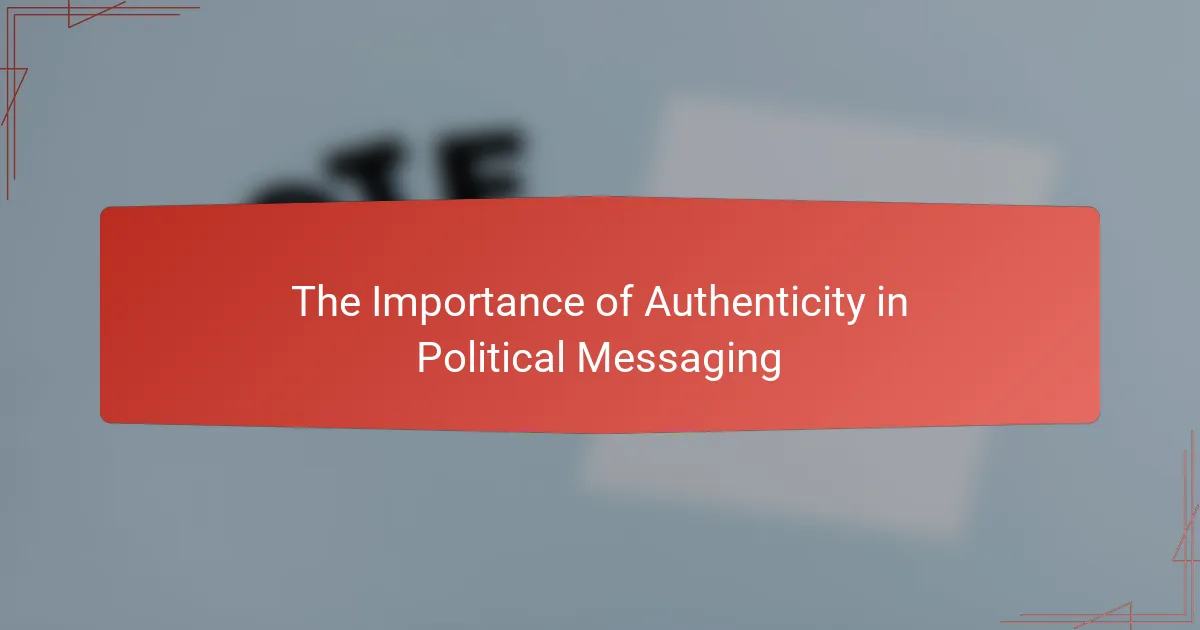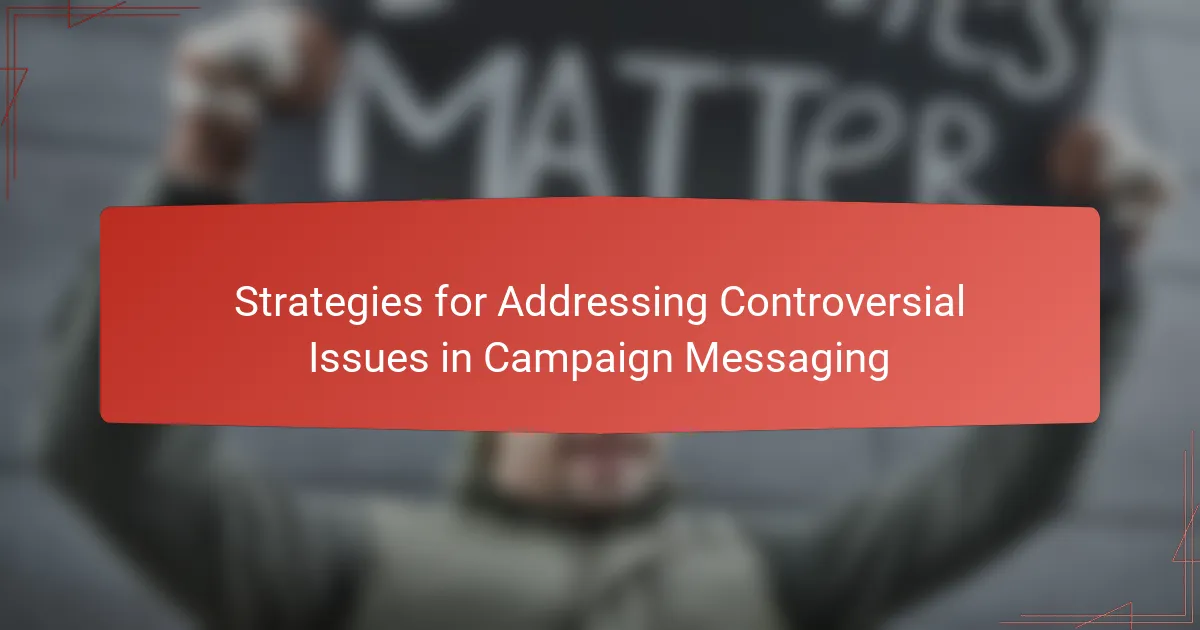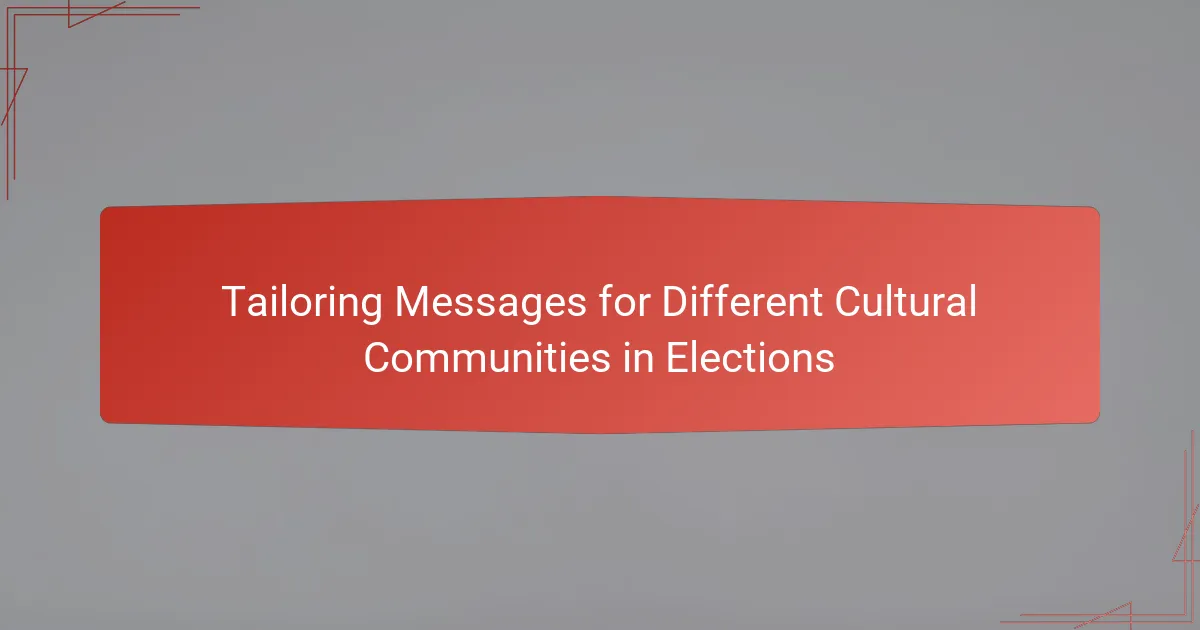Authenticity plays a crucial role in political messaging, as it fosters trust and connection between candidates and voters. Genuine political messages resonate more deeply, enhancing engagement and support from the electorate. By employing strategies such as transparent communication and consistent messaging, candidates can build the credibility necessary for successful campaigns.
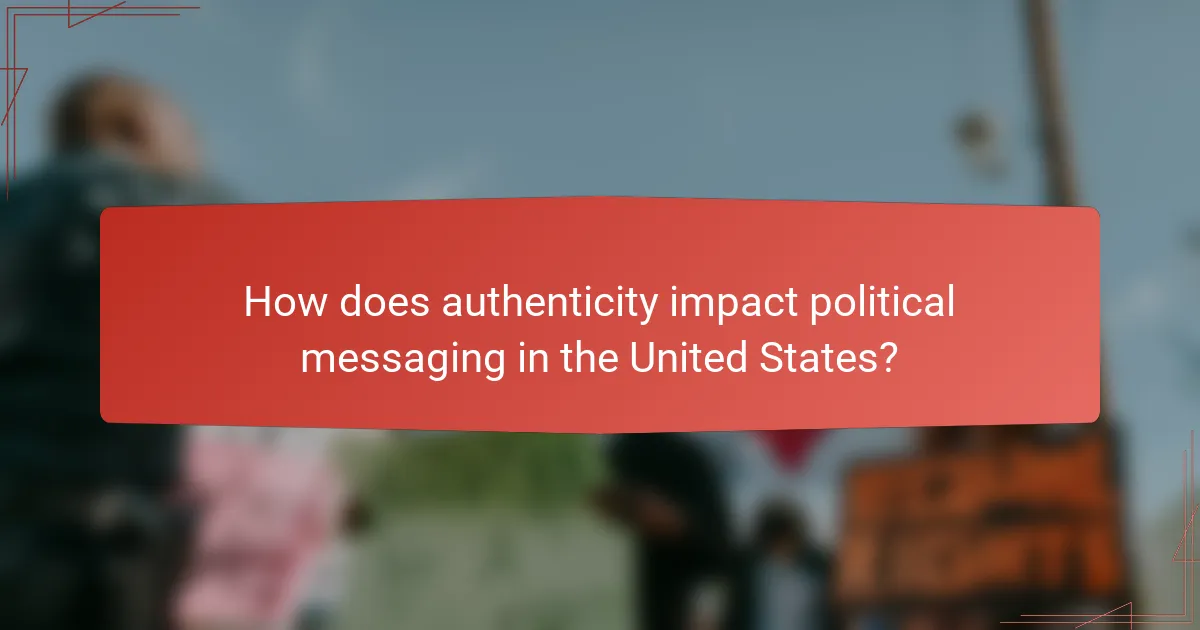
How does authenticity impact political messaging in the United States?
Authenticity significantly influences political messaging in the United States by fostering trust and connection between candidates and voters. When political messages are perceived as genuine, they resonate more deeply, leading to stronger engagement and support from the electorate.
Increases voter trust
Authentic political messaging builds voter trust, which is crucial for any successful campaign. When candidates communicate honestly and transparently, voters are more likely to believe in their intentions and policies. This trust can lead to increased voter turnout and loyalty.
For example, candidates who share personal stories or admit their mistakes often find that voters appreciate their honesty, which can enhance their credibility. In contrast, overly polished or scripted messages may come off as insincere, potentially alienating constituents.
Enhances candidate relatability
Authenticity makes candidates more relatable to voters, allowing them to connect on a personal level. When candidates express their values and experiences genuinely, they can reflect the concerns and aspirations of their constituents. This relatability can be a decisive factor in swaying undecided voters.
For instance, a candidate who openly discusses their background, struggles, and motivations can foster a sense of shared experience with voters. This connection often leads to a more engaged and supportive base, as people feel they are voting for someone who truly understands their lives.
Improves campaign effectiveness
Authentic messaging can enhance the overall effectiveness of a political campaign by creating a strong narrative that resonates with voters. Campaigns that prioritize authenticity are often more successful in mobilizing grassroots support and generating enthusiasm among volunteers and donors.
To maximize effectiveness, candidates should focus on consistent messaging that aligns with their true beliefs and values. This approach not only strengthens their brand but also encourages a more passionate and committed voter base, ultimately leading to better campaign outcomes.
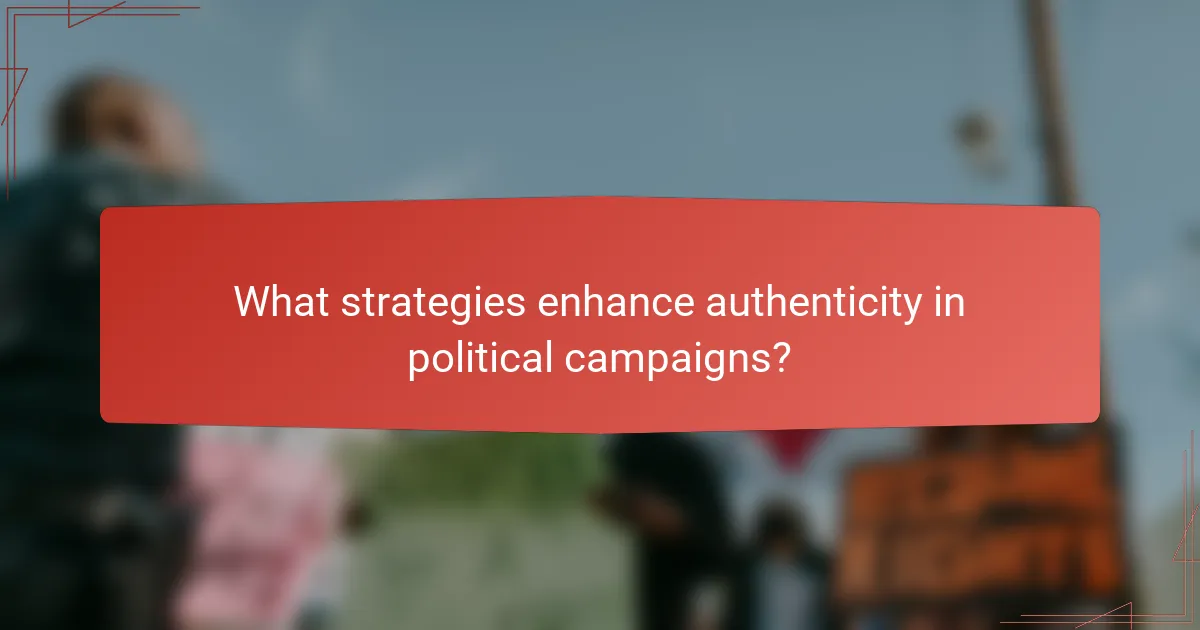
What strategies enhance authenticity in political campaigns?
Strategies that enhance authenticity in political campaigns include transparent communication, consistent messaging across platforms, and actively engaging with constituents. These approaches help build trust and credibility, essential elements for successful political messaging.
Transparent communication
Transparent communication involves sharing information openly and honestly with the public. Politicians should provide clear explanations of their policies, decisions, and the rationale behind them. This can include regular updates through press releases, social media, and town hall meetings.
To enhance transparency, campaigns can utilize tools like fact-checking resources and Q&A sessions where constituents can ask questions directly. This openness fosters a sense of trust and allows voters to feel more connected to their representatives.
Consistent messaging across platforms
Consistent messaging across platforms ensures that the same core message is communicated, regardless of the medium. This includes aligning messages on social media, campaign websites, and traditional media outlets. Consistency helps reinforce the candidate’s brand and values.
To maintain consistency, campaigns should develop a clear messaging framework that outlines key themes and talking points. Regular training sessions for campaign staff can also help ensure that everyone is on the same page, reducing the risk of mixed messages.
Engaging with constituents
Engaging with constituents is crucial for demonstrating authenticity. This can be achieved through various methods, such as hosting community events, participating in local forums, and responding to feedback on social media. Active engagement shows that politicians value their constituents’ opinions and are willing to listen.
To maximize engagement, campaigns should prioritize outreach efforts in diverse communities and utilize surveys to gather input on key issues. This not only builds rapport but also allows candidates to tailor their messaging to better reflect the needs and concerns of their constituents.
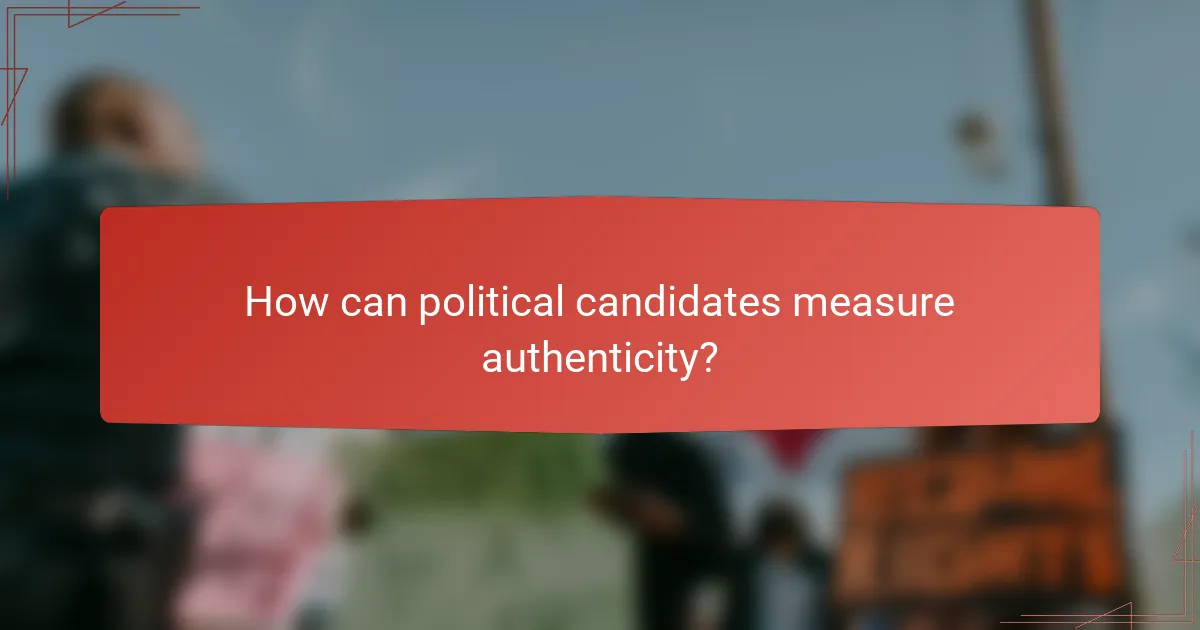
How can political candidates measure authenticity?
Political candidates can measure authenticity through various methods that gauge public perception and engagement. Key approaches include collecting voter feedback, analyzing social media interactions, and conducting focus groups to understand how their messaging resonates with constituents.
Voter feedback surveys
Voter feedback surveys are a direct way to assess how authentic candidates appear to their audience. These surveys can include questions about candidates’ perceived honesty, relatability, and alignment with voters’ values. A well-structured survey can yield insights into which aspects of a candidate’s messaging resonate most strongly.
To maximize effectiveness, surveys should be distributed widely, ideally reaching a diverse demographic. Candidates may consider using online platforms to facilitate quick responses and analyze results efficiently.
Social media engagement metrics
Social media engagement metrics provide real-time data on how audiences interact with a candidate’s messaging. Metrics such as likes, shares, comments, and overall reach can indicate whether voters find a candidate’s communication genuine and relatable. High engagement rates often suggest that the messaging resonates authentically with the audience.
Candidates should regularly monitor these metrics and adjust their strategies accordingly. For example, a spike in comments may highlight a topic that voters feel strongly about, signaling an opportunity for deeper engagement.
Focus groups
Focus groups offer a qualitative approach to measuring authenticity by gathering small groups of voters to discuss their perceptions of a candidate. This method allows for in-depth conversations about specific messages and themes, revealing nuances that surveys might miss. Candidates can gain valuable insights into how their authenticity is perceived in various contexts.
When organizing focus groups, it’s crucial to select participants who represent the candidate’s target demographic. Facilitators should encourage open dialogue and ensure that all voices are heard, which can lead to more honest feedback about the candidate’s authenticity.

What role does social media play in authentic political messaging?
Social media is crucial for authentic political messaging as it provides a platform for direct engagement between politicians and the public. This immediacy fosters transparency and allows for messages that resonate more genuinely with constituents.
Facilitates direct communication
Social media enables politicians to communicate directly with their audience, bypassing traditional media filters. This direct line allows for more personal and relatable messaging, which can strengthen voter trust and connection.
For instance, platforms like Twitter and Instagram allow politicians to share updates, respond to questions, and address concerns in real-time, making their communication feel more immediate and authentic.
Amplifies grassroots movements
Social media serves as a powerful tool for grassroots movements, helping to mobilize support and spread messages quickly. Activists can share their stories and rally others around common causes, creating a sense of community and shared purpose.
Campaigns that leverage social media effectively can reach a wider audience, often leading to increased participation in events and initiatives, as seen in various political movements worldwide.
Encourages real-time feedback
Real-time feedback on social media allows politicians to gauge public opinion and adjust their messaging accordingly. This responsiveness can enhance the authenticity of their communication, as it reflects the concerns and interests of their constituents.
Engaging with followers through polls, comments, and direct messages can provide valuable insights, helping politicians to stay aligned with the values and expectations of their audience.

What are the risks of inauthentic political messaging?
Inauthentic political messaging can severely undermine a campaign’s effectiveness and credibility. When voters perceive messages as insincere or misleading, it can lead to significant negative consequences for political figures and parties.
Loss of voter trust
When political messaging lacks authenticity, it can lead to a substantial loss of voter trust. Voters are more likely to disengage from candidates who fail to present genuine beliefs and values. This erosion of trust can manifest in lower voter turnout and decreased support in future elections.
To maintain trust, candidates should focus on transparency and consistency in their messaging. Engaging with constituents through town halls or social media can help reinforce a sense of authenticity and connection.
Negative media coverage
Inauthentic political messaging often attracts negative media attention, which can amplify public skepticism. Journalists and commentators are quick to highlight discrepancies between a candidate’s words and actions, leading to damaging headlines. This coverage can create a narrative that overshadows a candidate’s platform.
To mitigate negative coverage, candidates should ensure their messaging aligns with their actions and past statements. Proactively addressing potential issues in the media can also help shape a more favorable narrative.
Long-term brand damage
Inauthentic messaging can cause long-term damage to a political brand, making it difficult for candidates to recover in future elections. Once trust is broken, it can take years to rebuild a positive reputation among voters. This damage can extend beyond a single campaign, affecting the broader party image.
To protect their brand, candidates should prioritize authenticity in their messaging and remain committed to their core values. Regularly assessing public perception and adapting strategies accordingly can help maintain a strong, credible political presence.
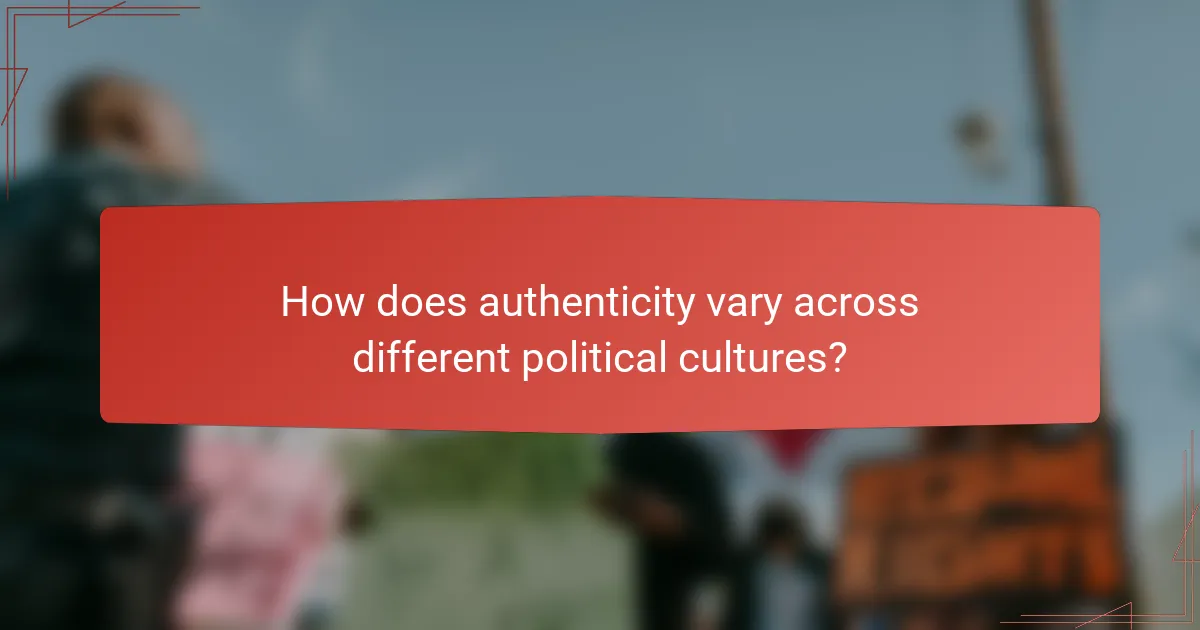
How does authenticity vary across different political cultures?
Authenticity in political messaging varies significantly across cultures, influenced by local values, historical contexts, and societal expectations. In some regions, voters prioritize transparency and personal connection, while in others, adherence to party lines or ideological consistency may take precedence.
Regional differences in expectations
In North America, authenticity often means being relatable and open, with politicians expected to share personal stories that resonate with voters. In contrast, many European countries may emphasize a more formal approach, where expertise and policy knowledge are valued over personal anecdotes.
In Asia, the concept of authenticity can be tied to collectivism, where leaders are expected to reflect the values and aspirations of their communities rather than individual narratives. This can lead to a preference for messages that align with cultural traditions and societal harmony.
Impact of cultural values
Cultural values shape perceptions of authenticity in political messaging. For instance, cultures that prioritize individualism may favor candidates who express personal beliefs and experiences, while collectivist cultures may appreciate leaders who emphasize group identity and consensus.
Moreover, in societies with high uncertainty avoidance, voters may seek politicians who provide clear, consistent messages that align with established norms. This can lead to skepticism towards unconventional or overly personal political narratives, which may be viewed as inauthentic or opportunistic.
